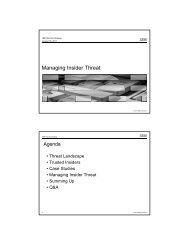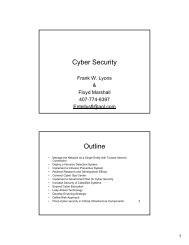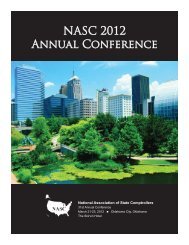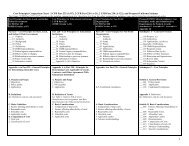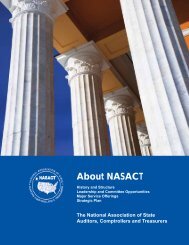Advisory Committee on Tax Exempt and Government Entities (ACT ...
Advisory Committee on Tax Exempt and Government Entities (ACT ...
Advisory Committee on Tax Exempt and Government Entities (ACT ...
Create successful ePaper yourself
Turn your PDF publications into a flip-book with our unique Google optimized e-Paper software.
<strong>Government</strong>al Relati<strong>on</strong>ship <strong>and</strong> Communicati<strong>on</strong> Between the Internal Revenue Service <strong>and</strong> Indian Tribal <strong>Government</strong>sITG was designed to provide a single point of c<strong>on</strong>tact for Tribes to obtain assistance<strong>and</strong> service from the IRS. As noted above, five field groups organized by regi<strong>on</strong> provideprimary fr<strong>on</strong>t-line service. These field groups c<strong>on</strong>sist of ITG specialists <strong>and</strong> their directsupervisors who work in locati<strong>on</strong>s relatively near the seats of the Tribal <strong>Government</strong>sthey serve. As noted <strong>on</strong> the IRS website, “[o]ur specialists can address issues <strong>and</strong>provide guidance unique to Indian country. Issues may relate to tribal governments asemployers, distributi<strong>on</strong>s to tribal members, <strong>and</strong> the establishment of governmentalprograms, trusts <strong>and</strong> businesses.” ITG also has two other groups performing important functi<strong>on</strong>s.The first of these, the ADAPT group, employs nine specialists <strong>and</strong> their directsupervisor, <strong>and</strong> its primary functi<strong>on</strong> is to identify potential tax frauds <strong>and</strong> abusive taxschemes at Tribal facilities <strong>and</strong> c<strong>on</strong>duct compliance checks <strong>and</strong> examinati<strong>on</strong>s designedto identify <strong>and</strong> curtail – or rule out the existence of – such frauds <strong>and</strong> schemes. Thesec<strong>on</strong>d of these, the Compliance <strong>and</strong> Program Management group, employs ten people<strong>and</strong> their direct supervisor, <strong>and</strong> its primary functi<strong>on</strong>s are to maintain ITG’s tribal c<strong>on</strong>tactdatabase, coordinate the implementati<strong>on</strong> of ITG’s Annual Work Plan, select cases forcompliance checks <strong>and</strong> examinati<strong>on</strong>s using ITG’s critieria for case selecti<strong>on</strong>, maintainITG’s web pages within the IRS website, <strong>and</strong> similar functi<strong>on</strong>s.B. IRS Protocols for its Day-to-Day Dealings with Tribal <strong>Government</strong>sIn recogniti<strong>on</strong> of the government-to-government relati<strong>on</strong>ships that exist between theFederal <strong>Government</strong> <strong>and</strong> Tribal <strong>Government</strong>s, the IRS has established importantprotocols for its day-to-day dealings with Tribes. These protocols, which are nowc<strong>on</strong>tained in Secti<strong>on</strong>s 4.86.1.2 <strong>and</strong> 22.41.1.2 of the Internal Revenue Manual, were firstdeveloped in 2000, so<strong>on</strong> after ITG was established. While not phrased in m<strong>and</strong>atorylanguage, the protocols provide that when scheduling a visit to a Tribal entity, IRSpers<strong>on</strong>nel should (a) c<strong>on</strong>tact the resp<strong>on</strong>sible Tribal official(s) via teleph<strong>on</strong>e or mail <strong>and</strong>set a c<strong>on</strong>venient time to meet, (b) inform the official(s) of the purpose of theappointment <strong>and</strong> whether it is an educati<strong>on</strong>/outreach endeavor, compliance check, orexaminati<strong>on</strong>, <strong>and</strong> (c) express a willingness to repeat the informati<strong>on</strong> to the TribalCouncil or other Tribal representatives if requested. The protocols further describe howthe initial meeting with the Tribal official(s) or their designee(s) should be c<strong>on</strong>ducted <strong>and</strong>how the assignment should be completed. The protocols specify that “[p]ers<strong>on</strong>alc<strong>on</strong>tact is essential to obtain an underst<strong>and</strong>ing of tribal perspectives <strong>and</strong> c<strong>on</strong>cerns.”I.R.M. §§ 4.86.1.2, 22.41.1.2. ITG has implemented these protocols by asking eachTribal chairpers<strong>on</strong> for directi<strong>on</strong> regarding the Tribal officials who should be c<strong>on</strong>tacted,<strong>and</strong> by communicating directly with the Tribal chairpers<strong>on</strong> any time an examinati<strong>on</strong> isplanned. In the absence of tailored instructi<strong>on</strong>s from the Tribal chairpers<strong>on</strong>, ITG’s policyis to initiate all c<strong>on</strong>tacts with the Tribe at the level of the Tribal chairpers<strong>on</strong>. Although itappears that most ITG specialists follow these protocols, we are aware of occasi<strong>on</strong>swhen IRS agents outside of ITG have ignored the protocols <strong>and</strong> proceeded in a mannernot acceptable to Tribal <strong>Government</strong>s.ADVISORY COMMITTEE ON TAX EXEMPT AND GOVERNMENT ENTITIES (<strong>ACT</strong>) June 11, 2008 6






